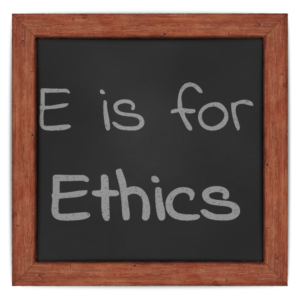 Copyright © 2018 by Barney Rosenberg
President, Ethics Line, LLC™
barney@ethicslinellc.com
Copyright © 2018 by Barney Rosenberg
President, Ethics Line, LLC™
barney@ethicslinellc.com
When talking about Ethics the tendency is to get all philosophical and academic. But you and I know better, right? Let’s test that assumption. One way to think about Ethics is “I know it when I see it!” But it’s more likely that we know it when we see signs of unethical behavior. After all, it’s what we business ethics practitioners do best. We are paid to notice! My friend Professor Tom White (PhD in Philosophy by the way) says that ethics used to be about keeping the help from stealing the silverware. But where I grew up in the Bronx we didn’t have any “help” or silverware. Professor White has long since moved on from the classic philosophers to teaching business ethics (one of the few who does). He is also the creator and patron saint of the International Business Ethics Case Competition (IBECC). Look it up on line and sign up to be a judge for these fabulous students from around the world. They have deep insights into the world of global business they will soon enter. I learn from them every time. Wikipedia tells us that Ethics is a branch of philosophy that involves systematizing, defending and recommending concepts of right and wrong conduct. But how is ethics different from morals? I found this interesting view on a Google search: while they are sometimes used interchangeably, they are different: Ethics refers to rules provided by an external source, e.g., codes of conduct in workplaces or principles in religions. Morals refer to an individual’s own principles regarding right and wrong. Not bad! The simplest way to think about it is also from Professor White: “Ethics is from the Greek. Morals is from the Latin. Simple. They mean the same thing.” I’ll go with that! Again, generally, both are frameworks to think about and resolve questions of good and evil, right and wrong, virtue and vice, justice and crime. In our world of business ethics, I think it’s about the standards we will work toward to deliver to our customers what they pay us to make for them; to keep our company out of trouble; and our people out of prison. We develop Codes of Conduct; Ethics and Business Conduct policies; Anti-corruption policies; supplier Codes of Conduct; and so much more. We train to those policies. We put in place call lines, ethics lines, hot lines – we advertise them on posters. We have teams of people (internal and external) who manage the calls, investigations and responses. We are serious about doing the right things the right way. And there are lots of alphabet soup enforcement agencies waiting to step into our breaches. With a little bit of luck and careful scrutiny of the front pages and cable news, we can steer a course to better results than the companies that grab the headlines for the bad choices they made. So what should we tell our corporate leaders and co-workers about the difference between ethics and morals? I wouldn’t worry about that. I would rather encourage them to travel the right path. They know what it is and where it takes us. Ethics is about what we do when nobody is looking! What’s your advice?


 Copyright © 2018 by Barney Rosenberg
President, Ethics Line, LLC™
barney@ethicslinellc.com
Allow me a few sentences and I will tell you what that other word is! I promise.
Imagine that you are sitting in your office, logged onto your computer when the emails start arriving and the phone starts ringing. Some of your co-workers at a manufacturing location are worried about one of their colleagues who has been acting strangely. They worry that he may come in one day and “go postal” (see explanation * below) and they don’t know what to do. They don’t know who to tell.
The other F word is FEAR!
You agree to meet with them after hours, off campus. Six of them show up and tell you how bad things are. The words LACK of trust keep coming up. But FEAR is the biggie!
An intervention is called for and you reach out to a psychologist you know and have worked with before. He specializes in industrial situations and is truly spectacular.
Together with the site HR folks you organize a group meeting with 20 front line supervisors and the psychologist. After introductions and some warm ups, he poses this question: “Suppose during the next performance evaluation cycle you don’t give them their written evaluation on the day of their review. Instead, you give the people you work with their written evaluations the night before. That way they can take it home; read it over; think about it; and come in the next day for a deeper, more productive conversation.”
The reaction would have been hard to predict. “Oh, no! They’ll just get angry and act out violently!”
Turns out they were afraid of the people they supervised.
And the people they supervised were:
Copyright © 2018 by Barney Rosenberg
President, Ethics Line, LLC™
barney@ethicslinellc.com
Allow me a few sentences and I will tell you what that other word is! I promise.
Imagine that you are sitting in your office, logged onto your computer when the emails start arriving and the phone starts ringing. Some of your co-workers at a manufacturing location are worried about one of their colleagues who has been acting strangely. They worry that he may come in one day and “go postal” (see explanation * below) and they don’t know what to do. They don’t know who to tell.
The other F word is FEAR!
You agree to meet with them after hours, off campus. Six of them show up and tell you how bad things are. The words LACK of trust keep coming up. But FEAR is the biggie!
An intervention is called for and you reach out to a psychologist you know and have worked with before. He specializes in industrial situations and is truly spectacular.
Together with the site HR folks you organize a group meeting with 20 front line supervisors and the psychologist. After introductions and some warm ups, he poses this question: “Suppose during the next performance evaluation cycle you don’t give them their written evaluation on the day of their review. Instead, you give the people you work with their written evaluations the night before. That way they can take it home; read it over; think about it; and come in the next day for a deeper, more productive conversation.”
The reaction would have been hard to predict. “Oh, no! They’ll just get angry and act out violently!”
Turns out they were afraid of the people they supervised.
And the people they supervised were: OK, this is kind of a touchy point with ethics practitioners. So I am going to vent a little. You’ll see why in a sentence or two and then you can weigh in with what you think about it.
I was talking to a relatively senior business executive about what I do. He said, “Oh, yeah, you’re the compliance guy.” I took a deep breath and started to explain. “No actually, you are. Because a failure of compliance could mean someone will go to prison and the regulators and prosecutors will come looking for the most senior person responsible for the conduct of the business. So, in a practical sense, you are the designated defendant.”
I have a little experience with that! Deep in the last century, I started my career out of law school as a white collar, criminal defense attorney. Now, I tell people I am a recovering lawyer.
Now back to that business executive. Here’s what I told him.
OK, this is kind of a touchy point with ethics practitioners. So I am going to vent a little. You’ll see why in a sentence or two and then you can weigh in with what you think about it.
I was talking to a relatively senior business executive about what I do. He said, “Oh, yeah, you’re the compliance guy.” I took a deep breath and started to explain. “No actually, you are. Because a failure of compliance could mean someone will go to prison and the regulators and prosecutors will come looking for the most senior person responsible for the conduct of the business. So, in a practical sense, you are the designated defendant.”
I have a little experience with that! Deep in the last century, I started my career out of law school as a white collar, criminal defense attorney. Now, I tell people I am a recovering lawyer.
Now back to that business executive. Here’s what I told him.